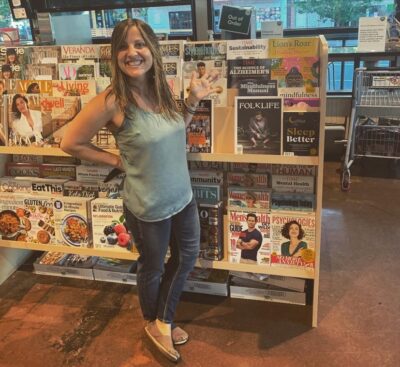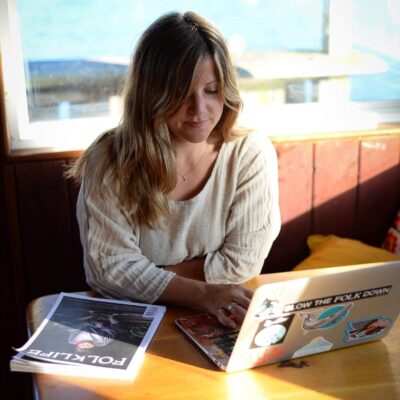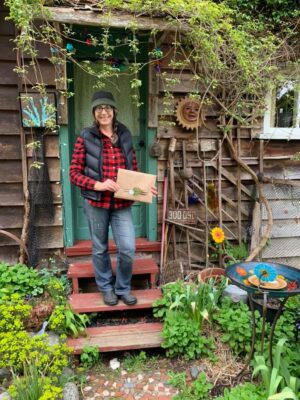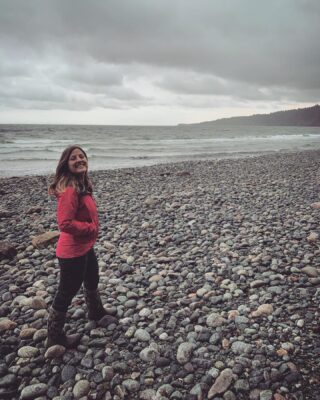Folklife Get Directions
A biannual lifestyle magazine celebrating West Coast island dwellers
A biannual lifestyle magazine celebrating West Coast island dwellers
Folklife Magazine is a love letter to BC’s Gulf Islands. This semi-annual magazine champions the stories of the individuals who call the islands home, celebrating the lifestyle of those who live close to the earth, move with intention, and craft life as an art form.
Each issue explores a single theme, told through engaging interviews, stories, photographs, recipes and artwork. Originally from Calgary, founder Alina Cerminara moved to the islands and was instantly struck by the lifestyle of those who lived by the sea. It inspired her to record their stories in print. We chatted about how the magazine came to life.

What’s the story behind Folklife Magazine?
I’m a big city girl originally, I’m from Calgary. I moved to Gabriola Island when I was 18, so I came to this place from a very urban viewpoint. It enabled me to really appreciate and acknowledge the way people on these islands live, which is so different to what I was used to. I was immediately struck by the place and I’ve kind of stuck around the islands ever since.
I ended up getting a Master’s Degree in publishing, and during the course of my studies I couldn’t believe there was no outlet that was celebrating the way people lived on the islands. So I was like, ‘wow, that would be such a great magazine idea.’
That was maybe eight years ago, I ended up getting sucked into another job as an event planner so I didn’t ever follow through on it. I got burnt out working events and I went traveling for a few years and I saw these beautiful magazines everywhere I was going. In the rest of the world it’s a lot more common to have these really striking $20 art books.
When I got back to the islands, I was struck again by the same thought. Nobody is doing this. There’s no high-quality celebration of the way people are living. It led to me putting together a business plan while I was travelling. The only way I was going to do it justice is if I found somebody who could make it beautiful. I can do most things but I’m not a designer! I found Patrick right away.
He has similar aesthetic ideas and I knew right away he was a great fit. That was summer 2019, we had this 25-page business plan and we got to work on Folklife Magazine.
What inspires the stories in Folklife Magazine? 
The way people live on the Gulf Islands is very intentional. It’s very close to the earth. Whether that’s chopping wood, being on the ocean, or growing their own vegetables, the people that life here are so hands-on and connected to the land around them.
It’s also very creative. There are so many artists on these islands doing such creative work, so many unique businesses, and people living their lives in a free way. To come from a city background, it’s the opposite of the rat race you see in big urban centres. It’s kind of become our tagline, celebrating those who live with intention and creativity. That’s what the magazine is all about.
What kind of stories in particular do you feature?
We really embrace diversity and we’re open to all kinds of interesting stories. What I find so interesting is that there’s so many amazing people who live next door to us and we just have no idea about them. To give some examples, we have featured profiles on a herbalist, the lives of a lighthouse keeper on a tiny rural island, we feature recipes from people living on the islands – really anything that’s interesting we welcome it.
We also have introspective pieces people submit. It might be a moment in time, maybe a morning routine, or something somebody is proud to have created. We’ve also branched out to including more ‘how to’ style pieces. A good example of that is how someone shared a story about their mental health struggles and how they were able to find healing through Tarot.
We run everything from long features to short articles, photo series, and everything in between!
 Do you have a roster of regular contributors? Do you invite contributions from the community?
Do you have a roster of regular contributors? Do you invite contributions from the community?
We’re a very new magazine so we haven’t had time to build out a roster. Right now, we only have one regular contributor. Her name is Laura and she’s from Denman Island. I met her on Hornby Island one summer and she had started this big intentional community on Denman Island. She is a writer and right away she mentioned she’d love to explore all of the fascinating facets of what it takes to run an intentional community.
Truth be told, I am learning as I go and I’ve never done this. Right away I committed to her becoming a columnist and fortunately she turned out to be a fabulous writer. Every issue we publish now has a story she’s written about that intentional community. We plan on getting more involved with regular contributors but we’re still trying to figure out what that will look like. You have to ensure they’ll be a good fit.
We’re always looking for content and to elevate new voices. The more contributors the better! We always have a call out – whether that’s people who want to interview others or experiences they want to share.
How can people support Folklife Magazine?
There are lots of ways! Of course, people can start by subscribing to the magazine. If they have a like minded business they can contact us about coming on board as an advertiser. We do our best to make sure all the ads we feature fit aesthetically and are as like-minded with the content as possible. We get a lot of compliments on how we do that.
We’ve gotten a lot of feedback on how much community Folklife has brought to all the people we do work with. Not just advertisers, but also photographers and writers and people like that. You can find us on social media, share what we’re doing with your friends, and even give the gift of Folklife. It’s only $20, it’s reasonable and it’s a gift that keeps on giving because you can read it for hours and hours.
What’s your favourite thing about living in the Gulf Islands?
The diversity of people to start with. Everybody has strong views on the way they live. It’s such a contrast to city life. I look at my friends back in Calgary, they are all still doing the same stuff, which is fine, but they all have that house, the job they’ll have until retirement etc, just living the usual urban life. The people here have six dogs, they’re living in a tiny home off the grid, or they’re converting their Airstream.
The people here try to live off their work, their art, and it’s just so inspiring to me. Everybody is also just so heartfelt. I would say people have different priorities living on the islands, it’s a much slower pace of life and they don’t really care what the mainstream has to say.
I realize I’m presenting a romanticized version here. It’s hard work sometimes. The islands have their own issues. Many people struggle to pay rent or buy a home here. The winters can be brutal living so close to the ocean. That’s why it can be so seasonal. Winter is very much a time for rest and renewal, and it can be quite bittersweet.
Why do you think it’s important people support small businesses like yours?
When you shop with local businesses it’s more than just purchasing a product. It’s a way to connect with the people around you and support them. It brings a vibrancy to the community you just don’t get with bigger businesses. It’s amazing to me to see small businesses come together and support one another.
We work with local photographers and makers to make Folklife happen. They are all their own business and they’re all supporting each other online and through word of mouth. It makes you feel loved to see that support, it becomes like a family around you.
Photo Credits:
A biannual lifestyle magazine celebrating West Coast island dwellers
Kari Morgan is one of the foremost young Indigenous artists working in BC. She has displayed artwork across the Northwest, Vancouver, and Seattle, showcasing her distinctive minimalist style that blends traditional First Nations art with contemporary influences.
Read the Full StorySummit Tiny Homes are a Vernon-based designer and manufacturer of custom-built tiny homes.
Read the Full Story Back to Top
Back to Top
We respectfully acknowledge our place of work is within the ancestral, traditional and unceded territories of the Xʷməθkʷəy̓əm (Musqueam), Sḵwx̱wú7mesh (Squamish) and səl̓ilwətaʔɬ/sel̓ílwitulh (Tsleil-Waututh) and that we serve the Peoples of the many Nations throughout British Columbia.